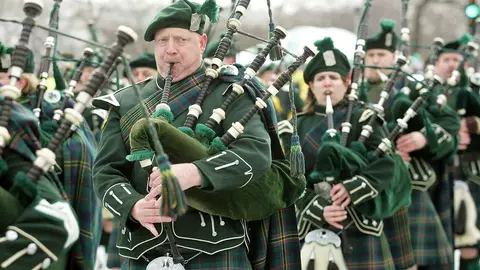Cincinnati's St. Patrick’s Day Parade Marks Its Seventh Year as "Anti-LGBTQ Event"

For the seventh year in a row, LGBTQ groups will not be allowed to participate in Cincinnati’s St. Patrick’s Day Pride Parade.
On March 16, hundreds will don leprechaun hats and green apparel to march from Paul Brown Stadium to Fountain Square, the epicenter of Cincinnati’s downtown business district. But as city councilman Chris Seelbach reminded attendees in a Sunday Facebook post, LGBTQ community organizations will not be joining them.
Seelbach, the Ohio city’s first openly gay elected official, called the parade an “anti-LGBTQ event.”
“Most, if not all, elected leaders in Cincinnati have refused to participate since 2013 when parade organizers announced that LGBTQ groups were not welcome,” he said, calling on locals to “please consider skipping this event” in solidarity with the LGBTQ community.
The controversy began six years ago when the Greater Cincinnati chapter of GLSEN, the nation’s leading LGBTQ youth advocacy group, was informed it would be barred from the event. In a statement, the Cincinnati St. Patrick's Day Parade Committee claimed the organization “did not abide by the Parade's requirements” during its participation at the previous year’s parade.
“The Parade has a rich history in Cincinnati, but has always required that the Parade should not be used for advancing any political party, social movement, or cause,” the group claimed at the time.
Seelbach says that statement doesn’t tell the whole story.
“At the beginning, it was absolutely communicated to [GLSEN representatives] that they were not allowed entry because they were an LGBTQ-oriented group,” he tells NewNowNext. “There was a lot of backlash from that, and so their story started changing a bit.”
After the refusal of LGBTQ groups attracted nationwide backlash, Seelbach says organizers changed their tune. Now they claimed GLSEN’s signs were inappropriate for the event. The signs said “Safe Schools for All.”
GLSEN clarified its intent was to make “students feel like part of their community.”
“Everywhere we go, we encounter parents and youth who need our support,” Josh Wagoner, the former co-chair of GLSEN’s Greater Cincinnati chapter, said in a statement. “Our visible participation makes a difference. We are horrified by the message this sends to LGBTQ youth, who suffer constant bullying and discrimination, that they are not welcome in Cincinnati.”
Seelbach claims he reached out to committee members to explain that GLSEN’s mission isn’t politically motivated, but he was rebuffed.
“Back in 2013, there were a dozen of us who were running for political office who had registered to be in the parade and had volunteers lined up and didn’t want to cancel,” he says. “We very much reached out to them in 2013 to see if we could resolve this. They never wanted to have that conversation.”
Cincinnati’s LGBTQ groups aren’t the only queer organizations that were denied entry to St. Patrick’s Day events in 2019. The Pride Center of Staten Island was also barred from its local parade for the second consecutive year.
Pride Center Executive Director Carol Bullock says she wasn’t even allowed to have an application.
“When I walked in and said my name and what organization I was from, I was told no,” she tells NewNowNext. “When I asked why, I was told that we ‘go against the tenets’ of the Catholic Church. They stated that our banner promoted a ‘homosexual lifestyle.’”
In comments to the Irish Voice, the parade’s president, Larry Cummings, claimed the yearly event is “not a political or sexual identification parade.”
Bullock calls the statement a “slap in the face.”
“It’s frustrating,” she says. “On a bigger scale, it’s another example of exclusion and discrimination that happens to many of the people who come [to our Pride Center] on a regular basis. We’re not looking to make the St. Patrick’s Day Parade into a Pride Parade. We’re looking to march like any other organization with our banner.”
While it was once common for LGBTQ groups to excluded from St. Patrick’s Day events, these incidents have become increasingly rare.
After nearly two decades of back and forth over queer and trans inclusion in the New York City St. Patrick’s Day Parade, a group representing LGBTQ employees from NBCUniversal was permitted to march in 2015. Two years ago, Boston’s parade refused participation to an LGBTQ veterans group, but reversed the decision just days later.
While the Cincinnati and Staten Island parades have refused to revisit their policies, LGBTQ advocates in those cities say their local communities have been strongly supportive of allowing them to join.
When the Cincinnati St. Patrick’s Day Parade first turned GLSEN away, numerous local politicians boycotted the event. The city council voted to deny funding to the parade as long as it excludes LGBTQ groups, meaning that organizers have to pay out of pocket for street closures and a police presence.
“The official St. Patrick’s Day parade in Ireland is inclusive of LGBTQ people,” Seelbach says. “It’s strange that some of the versions of it in the U.S. are staunchly anti-gay like ours.”
Although several organizations opted not to march in this year’s Staten Island parade, Bullock did not encourage a boycott of the event, which took place this Sunday. But as she stood on the sidelines watching the floats pass by, she noticed businesses all along Forest Ave. had posted signs saying, “We Support Our LGBTQ Community.”
“I saw as many rainbow flags as I did Irish flags,” Bullock says. “A few of my friends had extras. People were walking up to them and asking, ‘Can I have one of those?’ It was very touching.”
The support “has helped lift me up again and helped me persevere,” she adds.





